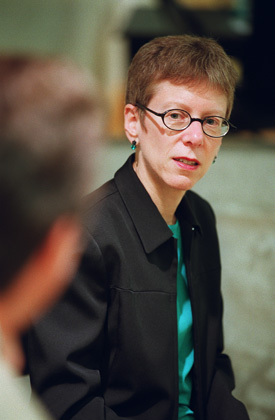From The Leonard Lopate Show, September 22, 2004, at the 14:04 mark on the RealAudio file, from a conversation with Terry Gross:
LOPATE: The question that people ask me the most is, “Do you read all of those books?” And I don’t know what to say. I do get help. And I usually say, “I get help.” But they don’t want to hear that. They want to believe that all I do, day and night, even on the air, is read books for tomorrow’s show.
GROSS: Well, what I say is that I read all the books. But I put — use my fingers to put quotation marks around the word “read.” ‘Cause what I do when I read the book is probably a closer approximation to skimming. ‘Cause I’m reading really fast and then slowing down for parts that I think will be relevant to the interview. And then taking notes on what I read.
LOPATE: Have you discovered that it’s ruined your personal reading? It’s hard for me to read a novel today or anything else just for pleasure. Because questions are always from it. I want to ask, “Well, Mr. Dostoevsky, why did you have Raskolnikov do that in Chapter 6?”
GROSS: That’s a really good question. You know, often, on vacations, I read — I intentionally read — a dead author. So that I’m not doing what you just said. So that I’m off the hook. So I can just read it. But this summer was one of the first vacations in a long time I did not read a whole novel. I read part of a novel. And then I found myself reading newspapers. It’s so hard not to read the newspaper right now. The newspaper itself is so interesting. And I feel like I can’t go a day without reading the newspaper. There are magazines that I wanted to catch up on. And I had to — I had to not read. I went to see one or two movies, or a movie and a concert, every day that I was on vacation. And I really felt I needed to spend a little bit of time not reading. Because I read so much.
LOPATE: When you’re putting together the questions you’re to ask, do you ever rely on those press kits? Their favorite question, which is, “Why did you write this book?”
GROSS: The part that I usually — I usually read the press releases because it’s a nice kind of frame before you start the book. When you’re reading at my pace, it’s nice to have a kind of brief overview of the book. So I’ll read reviews also. But I will intentionally not read the questions that the publisher gives. Because some of those questions are going to be good. Some of those questions are going to be questions that I would have asked anyways. But if I see those questions, it will make me think, “Well, I can’t ask that question.” Because that question has been put before me by a publicist and I’ll feel like I’m asking it because they told me to. So I feel like I can’t afford to look at it. So I’ll just, you know, do you know what I mean?
LOPATE: I know perfectly well. It’s almost a perversity, their pride that I have to do it all by myself. If I don’t want to rely on the publicity machine to tell me what to do —
GROSS: Well, you want to expect that your questions are independent of that. And yet a lot of the publicists are really smart. And they’re coming out with really good questions. So…
LOPATE: Well, they try to intrigue you into having the guest.
GROSS: Yes. So my technique is don’t read it.

 Terry Gross, recently referenced in
Terry Gross, recently referenced in